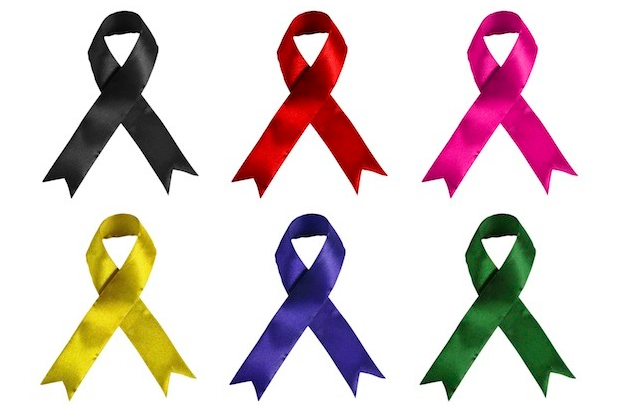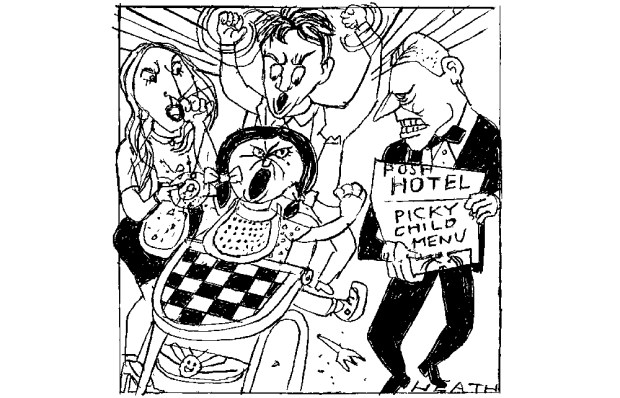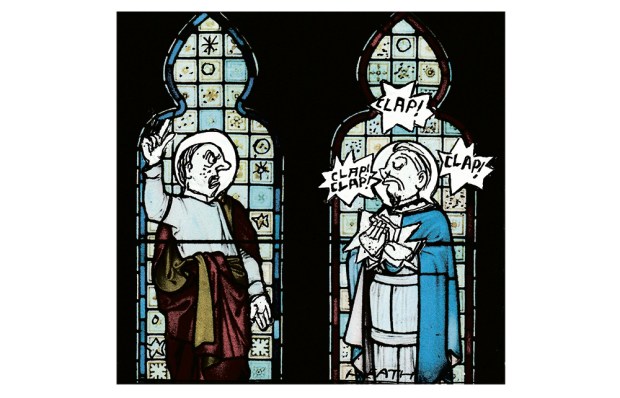I wish people would stop trying to raise my awareness. I can’t so much as surf the web or stroll a high street these days without being accosted by one of the aware, who is always hellbent on making me as aware as he is, usually about some disease or, if you’re really lucky, the rifeness of child abuse. The army of the aware are everywhere, covered from head to toe in awareness ribbons, their arms weighted down by awareness bracelets, their aware brains bulging with scary stats about Aids, rape, breast cancer or boozing that they are desperate to impart to us, the blissfully unaware. These awareness-raisers seem to be aware of everything except how annoying they are.
Raising awareness has become the aim of just about every political movement and charity of the 21st century. There was a time — seems like donkey’s years ago now — when socially minded folk were focused on changing the actual, physical, infrastructural world. Now they’re obsessed with re-arranging the brain furniture of those of us who don’t know how many men aged 18 to 35 die of testicular cancer every year or what sarcoidosis is. (Nope, I don’t know either — but April is Sarcoidosis Awareness Month, so we’ll no doubt find out.) Charities now raise awareness about poverty rather than trying to end it. Schools raise awareness about STDs. Government officials raise awareness about the dangers of binge-drinking, or what the rest of us call ‘having three pints’. And there’s no option to remain unaware. To say ‘I know quite enough about Aids, thanks very much’ or ‘I don’t want to know what getting drunk every Saturday night for the next 20 years will do to my liver’ is to mark oneself out as unfeeling, one of the ribbonless rabble who refuse to become aware.
There’s no escaping the awareness-raisers. In April we have the following to look forward to: Allergy Awareness Week, Bowel Cancer Awareness Month, Child Abuse Awareness Month, Male Cancer Awareness Week, Parkinson’s Awareness Week, STD Awareness Month, and Stress Awareness Month. That last one is quite handy, actually, because if anything is going to ratchet up the stress levels of the populace, it’s being subjected to a tsunami of awareness-raising ads and articles about disease, death and child abuse.
The awareness-raisers aren’t only on our TVs and in our papers. They’re in our pubs. Beer mats are increasingly used to raise awareness about everything from alcohol abuse to domestic violence to unsafe sex. Coppers and officials have plastered public loos with posters designed to raise awareness about human trafficking, prostate cancer, and drinking while preggers. Hell, they’re even colonising our clothing. A few years back, in the name, of course, of raising awareness, Tesco put in its Y-fronts and boxers a message for young men to ‘check their testicles once a month after a warm shower or bath’. The aware are literally getting into our pants.
Raising awareness in others these days actually means drawing attention to yourself. Ignoring historian William Hutton’s warning that, ‘The charity that hastens to proclaim its good deeds ceases to be charity, and is only pride and ostentation’, people now grow moustaches to let the world know they’re raising money for men’s health charities; they take pictures of themselves — ‘selfies’ — without make-up and post them on Facebook in the name of breast cancer awareness, and don ribbons to show how much they care about some plague or plight. In 1991 the red Aids ribbon was launched; now there’s a pink ribbon for breast cancer, a blue one for prostate cancer, an orange one for kidney disease — the list is endless. There is colour competitiveness and confusion in the ribbon world: the purple one can denote concern for pancreatic cancer or cystic fibrosis or Alzheimer’s. You’ll have to ask the wearer what terrible thing he or she is very publicly concerned about. Don’t expect all of them to know, though. Researching her book Ribbon Culture, the academic Sarah Moore found she had to remind some of her interviewees what their ribbons represented. But then, the colour and cause of a ribbon are not what’s important — a ribbon on a lapel, whatever its hue, is really about showing the world you are generally sensitive, aware, good.
Being aware is now the correct and conformist state of mind. Government-backed charities encourage us to be ‘drinkaware’ or ‘gambleaware’. Drinkaware, supported by the Home Office, might just be the most patronising charity in Christendom. ‘The only guaranteed way to avoid a hangover is not to drink alcohol,’ its website says. Thanks for that. The modern-day temperates who have devoted themselves to raising awareness about drink aren’t really interested in giving us serious info, far less in making us aware of just how joyous a bender with mates can be. Instead they parrot the killjoy view of boozing as a reckless act that is making Britain broken. To be drinkaware is actually to jettison your own judgment, to shelve your own experience-based awareness of the benefits of having a drink, and to bend your knee at the altar of what the aware have decided is the correct amount to drink.
The aware claim that they just want to enlighten the little people about the pitfalls and ailments of modern life. In truth, they have more in common with what Kant described as the ‘guardians’ holding humanity back from experience. Kant complained about having ‘a book that thinks for me, a pastor who acts as my conscience, a physician who prescribes my diet’, and he accused these self-elected guardians of teaching ‘the majority of mankind [to] consider the step to maturity, not only as hard, but as extremely dangerous’. Sing it, Immanuel. Today, we have the aware telling us what to drink, when to gamble, how to have sex, how scared we should be of disease. Human beings are perfectly capable of learning for themselves, from trial and error, from taking risks, from Google for God’s sake. ‘Dare to know,’ said Kant. Today, let’s dare to be unaware. Rip off the ribbons, shave the moustaches, bin the bracelets, shun the selfie and decide for yourself what you want your life in the 21st century to be like.
Got something to add? Join the discussion and comment below.
Get 10 issues for just $10
Subscribe to The Spectator Australia today for the next 10 magazine issues, plus full online access, for just $10.
You might disagree with half of it, but you’ll enjoy reading all of it. Try your first month for free, then just $2 a week for the remainder of your first year.















Comments
Don't miss out
Join the conversation with other Spectator Australia readers. Subscribe to leave a comment.
SUBSCRIBEAlready a subscriber? Log in